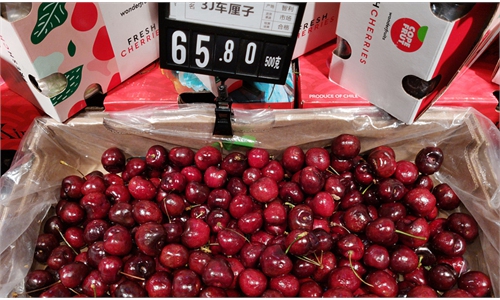China-Chile ties hold great promise for enhanced cooperation under BRI: Chilean Ambassador Mauricio Hurtado


A view of Valparaiso, Chile Photo: VCG
Editor's Note:
Chile is the first South American nation to establish diplomatic relations with China and the two also inked a free trade agreement (FTA). Chilean customs data shows its exports to China reached $38.11 billion in 2022, accounting for 38.9 percent of the country's total exports. Since 2009, China has consistently remained Chile's largest trading partner, with nearly 90 percent of Chilean cherry exports finding their way to the Chinese market. China's huge market demand has benefited the development of Chile's mining, agriculture, forestry, and fisheries sectors, contributing to improved employment and workers' income in Chile. At the core of this fruitful collaboration lies the Belt and Road Initiative (BRI), which, according to the Chilean Ambassador to China Mauricio Hurtado (Hurtado), has played an essential role in shaping economic ties between China and Chile. In an exclusive interview with the Global Times (GT), Ambassador Hurtado emphasized the great potential for further enhancing bilateral cooperation to pursue sustainable economic growth of both nations.

Chilean Ambassador to China Mauricio Hurtado Photo: Courtesy of the Chilean Embassy in Beijing
GT: The China-Chile FTA came into effect in 2006 and Chile has benefited greatly from the deal. Do you think there are still areas of cooperation that need to be deepened and broadened in this agreement? Could you elaborate?
Hurtado: Chile was the first country (outside of Asia) to sign an FTA with China in 2005 and we were among the first in the world to modernize the agreement in 2017. The modernization came into effect in 2019 and has been one of the largest trade liberalizations China has negotiated, thanks to deep trust between the two nations and the complementarity of their economies.
The modernization of the FTA incorporated two new chapters -- environment and electronic commerce. In addition, the chapters on trade in goods, rules of origin, customs procedures and trade facilitation, competencies, economic and technical cooperation, and trade in services were also updated.
In particular, the chapter on environment seeks to guarantee high levels of environmental protection, while the chapter on e-commerce - being the first time that provisions on this matter have been agreed upon - includes topics such as electronic transactions, electronic authentication, and online consumer protection, among others.
From the Chilean side, we have made constant efforts to increase the presence of our companies and products in online channels in China, and I consider it relevant to continue deepening this cooperation, taking advantage of the excellent reputation that Chilean products have earned in the market, and the great display and reach opportunity that the online channels provide us.
In another aspect, I believe it is important to strengthen bilateral economic and technical cooperation ties. Although these are issues that were outlined in the 2019 modernization of the FTA, which includes cooperation in agriculture, cross-border payments, and global value chains among others, I consider it highly relevant for the sustainability of our bilateral relationship, as well as investment and trade flows, that we manage to deepen.
GT: This year marks the 10th anniversary of the BRI. How would you assess the achievements resulting from the bilateral cooperation under this initiative? Additionally, what new areas of cooperation do you anticipate both sides could expand under the BRI?
Hurtado: Chile has observed with great interest the important achievements made by the BRI, an initiative that I consider to be one of the most relevant in economic cooperation. Chile was one of the first countries to support BRI. Former presidents Michelle Bachelet and Sebastián Piñera participated in the first Belt and Road Forum for International Cooperation in 2017 and the second forum in 2019 respectively. This year, as we celebrate the 10th anniversary of this initiative, we hope to continue this significant tradition and are working on coordinating the visit of President Gabriel Boric to China.
As these important political gestures by my country's leaders demonstrate, Chile believes that the BRI plays a fundamental role in our bilateral economic relationship. Likewise, we are convinced that this multilateral initiative plays a fundamental role in facing the current challenges of the global economy in terms of unlocking capital and working toward more sustainable growth.
Chile and China share a strong commitment to addressing climate change and the promotion of green transformation. Regarding green energy, both countries can explore investment and technology transfer opportunities in renewable energy sources, such as solar and wind, where we already have a dynamic bilateral exchange. Chile's vast renewable energy resources and expertise, together with China's clean energy technologies can create mutually beneficial partnerships.
Furthermore, the development of green hydrogen presents an exciting area of collaboration. Chile has abundant renewable energy resources at a very competitive price, making it an ideal location for green hydrogen production. China, on the other hand, is actively developing this technology. By leveraging our respective strengths, we can work together to develop the green hydrogen industry and promote its adoption in various sectors, including transportation and industrial processes.
In addition, the development of sustainable infrastructure is another area of potential cooperation. Chile has ambitious plans in this field, including the expansion of ports, airports, and transportation networks, while China has vast experience in construction and financing of such projects, ensuring that they are carried out in a sustainable manner.
In conclusion, Chile's participation in the BRI has resulted in increased investment and infrastructure development. Looking ahead, we anticipate further cooperation in areas related to sustainable development, such as green energy, green hydrogen, and sustainable infrastructure.
GT: China has been Chile's largest trading partner and export market for 13 consecutive years since 2009. How does Chile plan to enhance this cooperation? What new areas can the two countries explore for sustainable growth beyond traditional sectors?
Hurtado: As Chile's largest trading partner and export market, China has played a key role in promoting the development of our mining, agriculture, forestry, and fishing industries among others. Building on this solid foundation, Chile looks to further deepen our cooperation with China, while exploring new partnership areas for sustainable growth.
Regarding agricultural products, Chile aims to support the entry of higher value-added products. While we have been exporting a wide range of high-quality products, including fruit, seafood, meat and wine, we are looking to broaden our collaboration to focus on developing innovative and value-added agricultural products. By taking advantage of China's vast market and Chile's experience in sustainable agriculture, we can create opportunities for joint ventures and technology transfer, fostering innovation in areas such as food processing, packaging and distribution.
In addition to traditional sectors, Chile sees immense potential in creative industries, such as the animation, publishing and audiovisual sectors.
China's vast entertainment industry, coupled with Chile's talent in the creative arts, provides a foundation for collaboration. By fostering partnerships and exchanges between creative professionals, we can promote the co-production of films, the sale of rights, and the development of innovative content, exploring new avenues for cultural and commercial exchange between our two countries.
GT: Chile has the largest copper output in the world, accounting for 24 percent of the world's annual cooper production. How do you envision further cooperation between the two countries in exploring and developing Chilean mineral resources and expanding our cooperation?
Hurtado: There is significant potential for cooperation in new technologies, green mining, and new energy sources. Both Chile and China recognize the importance of transitioning to more sustainable mining practices.
By sharing knowledge and collaborating on research and development, we can promote the adoption of innovative technologies to optimize mining operations and minimize environmental impact.
Additionally, as leaders in renewable energy, Chile and China can explore partnerships to power mining operations with clean energy sources, contributing to global efforts to reduce carbon emissions in the mining sector.
Furthermore, Chile's mining service providers possess valuable experience and technology that can open new avenues for collaboration, not only in China but also in other regions where Chinese mining companies operate. Chilean companies specialized in mining engineering, equipment, and consulting services can contribute their knowledge and experience to improve the operational efficiency and sustainability of mining projects. This exchange of experience can foster stronger ties between our mining industries and create opportunities for mutual growth.

